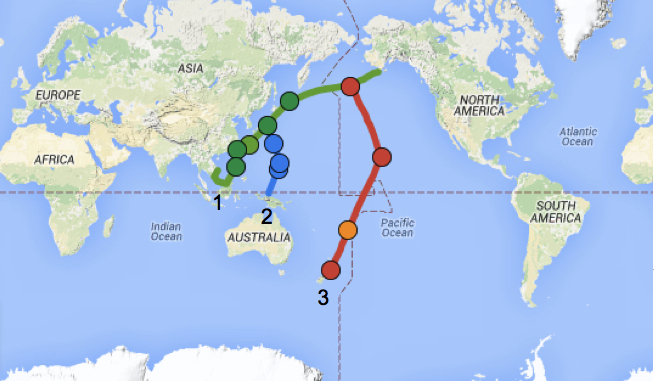
VANGUARD - Expressing the viewpoint of the Communist Party of Australia (Marxist-Leninist)
For National Independence and Socialism • www.cpaml.org
A recent statement by a US Cold War hawk, Elbridge Colby, has provided a fascinating insight into a plan to reassert traditional hegemonic positions across the Indo-Pacific region. A quick study of Colby's background shows a well-placed individual with one foot in either centres of US power: in the Pentagon, as a former assistant secretary of defence during the heady years of the Trump administration, 2017-18, and in Washington, as author of various studies circulating the corridors of power. His listed specialty would appear to be 'The Strategy of Denial', together with Island Chain Theory as a means of challenging China. (1)
A stated aim of Colby's is to establish a broad alliance across the region with 'the US … playing … the role of cornerstone of this coalition … designed to blunt Beijing's desire to dominate Asia, underwritten by a denial defence'. (2) No definition is provided of 'denial defence' although it can be safely assumed the US wants to use usual Cold War tactics and attempt to freeze China out of regional affairs by a general denial of their existence and participation in regional bodies.
Throughout Colby's study economic considerations merge with usual defence and security matters: China's rapid economic growth has created a serious challenge to traditional US positions, its military is regarded as aiming to 'project power far and wide'. (3) The aim of the proposed coalition is to force China to remain 'confined within the first island chain'. (4)
The remainder of Colby's study then focusses upon the centrality of Taiwan for US regional foreign policy as part of the first island chain, together with a warning that 'Australia's fate will be settled in the Western Pacific, where the great bulk of Asia's wealth and power are concentrated'. (5) Fears apparently exist that Australia will eventually be forced out of the area due to strategic competition with China.
The whole study by Colby is strangely at variance with factual information, easily accessible from within the public domain. China, for example, is not confined to the first island chain: as a member of the Asia-Pacific Economic Co-operation (APEC) organisation, China already has a large economic footprint across the wider region through 21 countries with three billion population, half of global trade and sixty per cent of world GDP. (6) China's recorded trade volume last year with APEC members amounted to $2.87 trillion, which amounted to 62 per cent of its total foreign trade. (7)
It has, furthermore, been officially recorded that China attracted $124.6 billion investment from APEC members last year, and also invested a total of $112.3 billion into the region, showing a relationship of 86 per cent to 73 per cent of inward and outward investment flows. (8) The figures reveal a country with a highly viable economy and workable diplomatic relations with regional counterparts who have a shared vision of their economic development programs. Why would APEC member countries, or those closely associated with it, even consider joining a US-led coalition aimed, specifically, at not co-operating with China?
The study by Colby can perhaps best be described as vacuous; the fact the editorial board of the Australian allowed almost a hundred column centimetres of their newspaper for its publication is a sad reflection on their own position and that of Canberra. So much for US-led regional sabre-rattling and related piffle and their cronies in Australia!
It, nevertheless, unfortunately has serious implications for Australia which could be drawn into limited and /or real-war scenarios at the behest of such people as Colby and the present US $778 billion defence budget.
We need an independent foreign policy!
1. A coalition will blunt Beijing's ambition, Australian, 31 December 2021.
2. Ibid.
3. Ibid.
4. Ibid., and, see diagram: Island Chain Theory.
5. Ibid, and, Study: US no longer dominant power in the Pacific, Paul D. Shinkman, Information Clearing House, 22 August 2019.
6. Closer ties with APEC members, The China Daily, 8 December 2021.
7. Ibid.
8. Ibid.